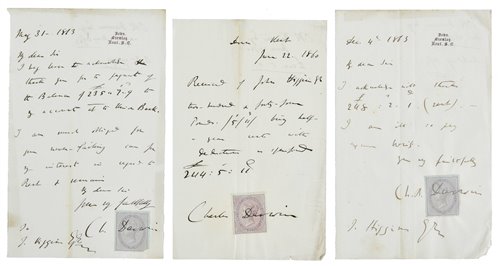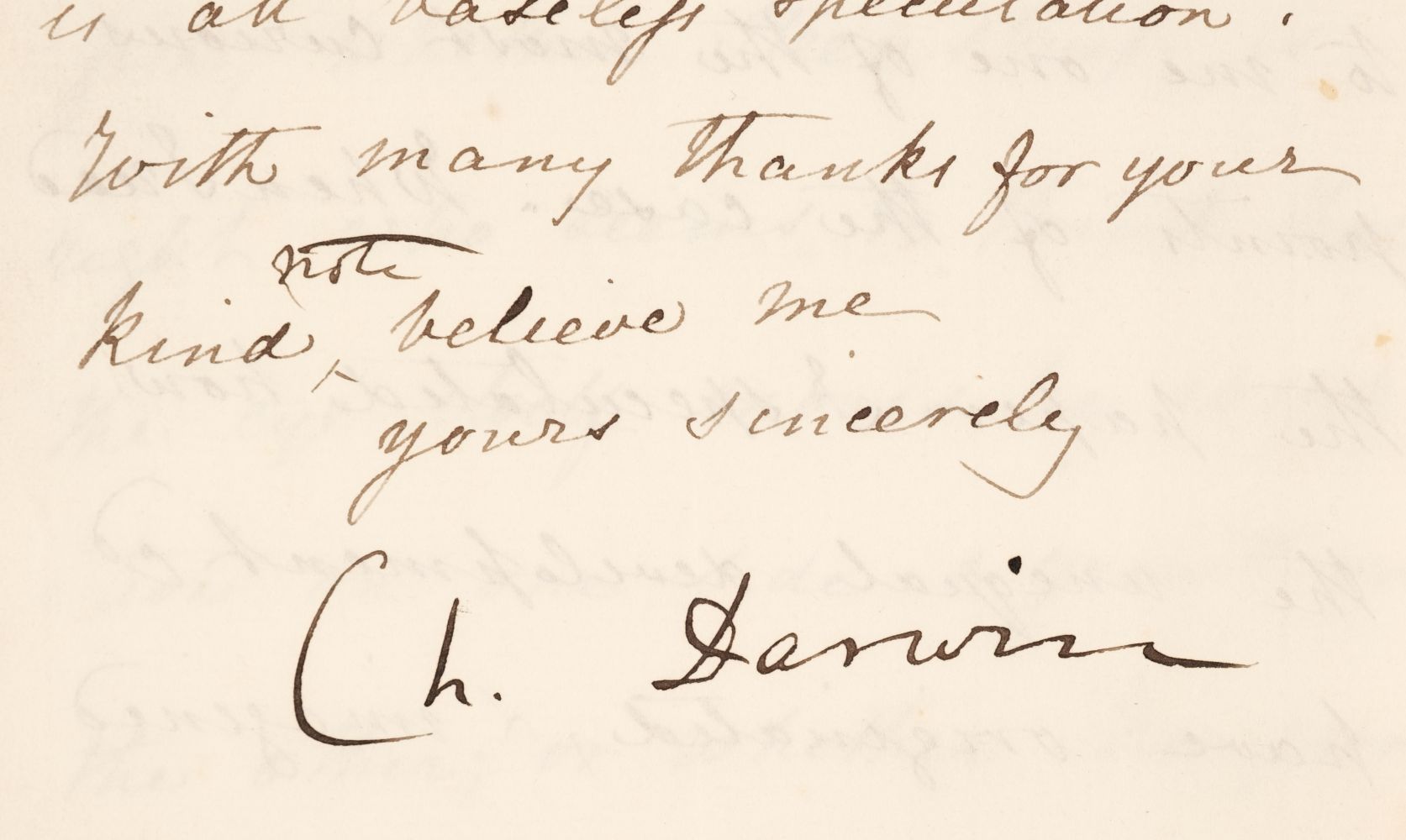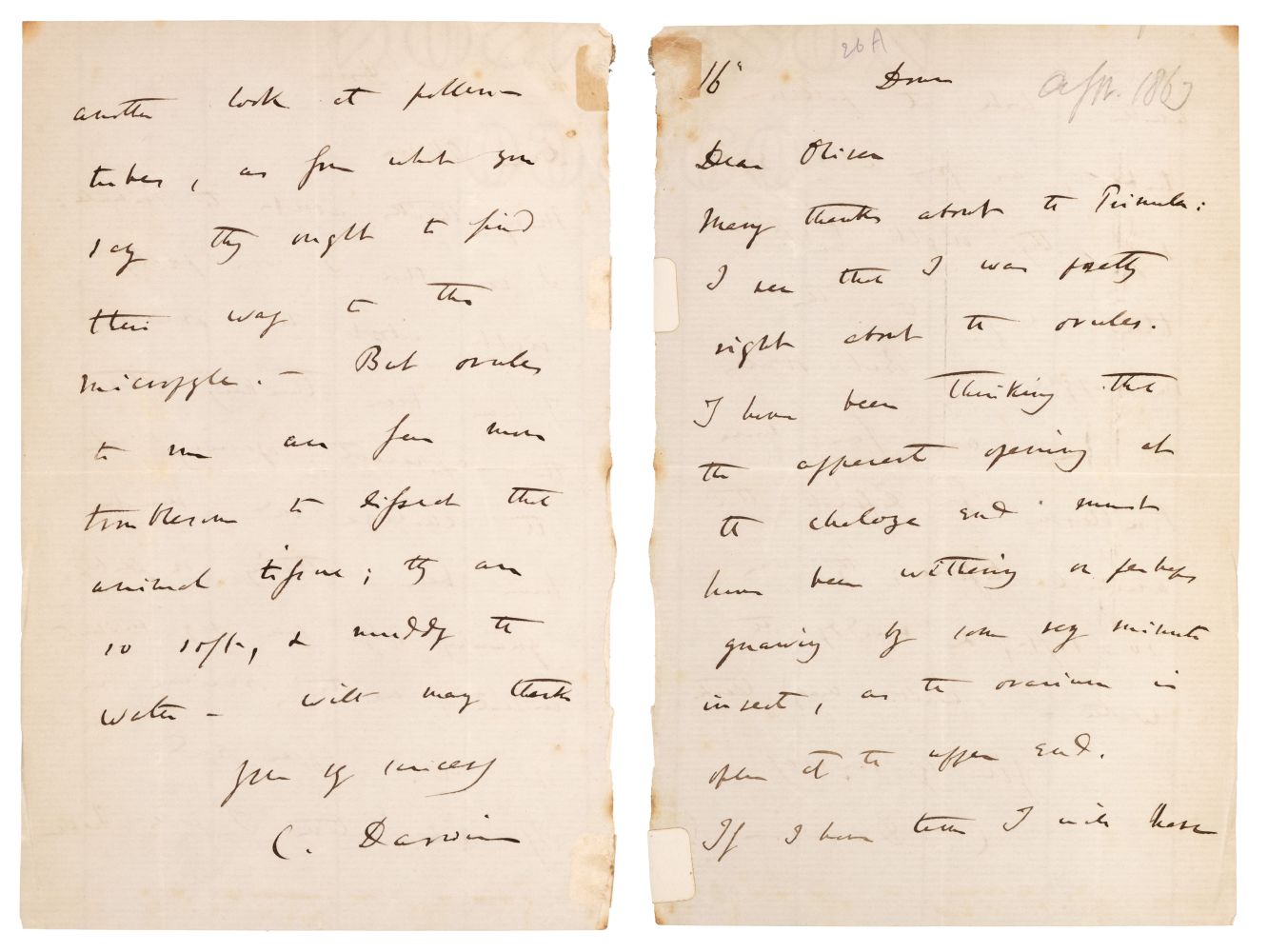DARWIN, Charles Robert (1809-1882). On the Origin of Species by Means of Natural Selection . London: John Murray 1859.
DARWIN, Charles Robert (1809-1882). On the Origin of Species by Means of Natural Selection . London: John Murray 1859. 8° in 12's (198 x 120mm). Folding lithographic diagram. 32-page list of John Murray's books at end, dated June 1859, printed on different paper. (Title, contents leaves and early quires lightly spotted, small chip to fore-edge to 251-252pp. not affecting text, small tear to fore-edge to 465-466pp. without loss.) Uncut in original green cloth, covers stamped in blind, spine lettered and decorated in gilt, brown glazed endpapers [Freeman's variant 'a' binding] (lightly rubbed, cloth at fore-edge of upper board just starting to lift, edges and corners bumped, the whole slightly cocked). Provenance : William Radford (19th-century ink inscription, 'WR' blind stamp to title) -- Nils Fries (bookplate). FIRST EDITION OF DARWIN'S GREAT WORK, marking 'a turning point, not only in the history of science, but in the history of ideas in general' (DSB III, p. 571). Although some key observations and findings from the voyage of the Beagle acted as his initial inspiration, Darwin's ideas about the beneficial mutation of species did not cohere into the theory of evolution until his reading of Thomas Malthus's Essay on the Principle of Population in the latter half of 1838. The theory which Malthus applied to humans made it clear to him that species in general competition left only the best adapted to biological life. While the randomness of the process made it irreconcilable with higher design, Darwin nevertheless treated nature anthropomorphically 'as a sort of omnipotent breeder who selected the most useful traits' (Adrian Desmond, James Moore and Janet Browne in ODNB). Before moving to Down House, he wrote a 35-page sketch of his evolutionary theory, completed in June 1842. By February 1844 he had converted this into a coherent 231-page essay. There was then a considerable break until late in 1854 when, having finished his barnacle volumes, he returned to collating his notes on species. On 14 May 1856, after consulting Charles Lyell, he began writing an extended treatise aimed at his peers. By March 1858 'Natural Selection' was two thirds complete at 250,000 words, the whole book projected to run to three volumes. Then in June 1858 Darwin received a letter about evolution from Alfred Russel Wallace, who had arrived at similar conclusions independently. This led to papers on the subject by both scientists being read to the Linnean Society of London on 1 July. To stay ahead of the field Darwin had now to publish more rapidly. Urged on by Hooker, he wrote an 'abstract' of 'Natural Selection', finishing a manuscript of 155,000 words in April 1859. 'The book, stripped of references and academic paraphenalia, was aimed not at the specialists, but directly at the reading public'. Finally published as On the Origin of Species on 24 November 1859 in a print run of 1250 copies, it expounded a theory of evolution that was recognisably superior and of infinitely greater impact than all previous hypotheses explaining biological diversity. Dibner Heralds (1980) 199; Eimas Heirs 1724; Freeman 373; Garrison-Morton (1991) 220; Grolier Science 23b; Norman 593; PMM 344b; Sparrow Milestones 49; Waller 10786.
DARWIN, Charles Robert (1809-1882). On the Origin of Species by Means of Natural Selection . London: John Murray 1859.
DARWIN, Charles Robert (1809-1882). On the Origin of Species by Means of Natural Selection . London: John Murray 1859. 8° in 12's (198 x 120mm). Folding lithographic diagram. 32-page list of John Murray's books at end, dated June 1859, printed on different paper. (Title, contents leaves and early quires lightly spotted, small chip to fore-edge to 251-252pp. not affecting text, small tear to fore-edge to 465-466pp. without loss.) Uncut in original green cloth, covers stamped in blind, spine lettered and decorated in gilt, brown glazed endpapers [Freeman's variant 'a' binding] (lightly rubbed, cloth at fore-edge of upper board just starting to lift, edges and corners bumped, the whole slightly cocked). Provenance : William Radford (19th-century ink inscription, 'WR' blind stamp to title) -- Nils Fries (bookplate). FIRST EDITION OF DARWIN'S GREAT WORK, marking 'a turning point, not only in the history of science, but in the history of ideas in general' (DSB III, p. 571). Although some key observations and findings from the voyage of the Beagle acted as his initial inspiration, Darwin's ideas about the beneficial mutation of species did not cohere into the theory of evolution until his reading of Thomas Malthus's Essay on the Principle of Population in the latter half of 1838. The theory which Malthus applied to humans made it clear to him that species in general competition left only the best adapted to biological life. While the randomness of the process made it irreconcilable with higher design, Darwin nevertheless treated nature anthropomorphically 'as a sort of omnipotent breeder who selected the most useful traits' (Adrian Desmond, James Moore and Janet Browne in ODNB). Before moving to Down House, he wrote a 35-page sketch of his evolutionary theory, completed in June 1842. By February 1844 he had converted this into a coherent 231-page essay. There was then a considerable break until late in 1854 when, having finished his barnacle volumes, he returned to collating his notes on species. On 14 May 1856, after consulting Charles Lyell, he began writing an extended treatise aimed at his peers. By March 1858 'Natural Selection' was two thirds complete at 250,000 words, the whole book projected to run to three volumes. Then in June 1858 Darwin received a letter about evolution from Alfred Russel Wallace, who had arrived at similar conclusions independently. This led to papers on the subject by both scientists being read to the Linnean Society of London on 1 July. To stay ahead of the field Darwin had now to publish more rapidly. Urged on by Hooker, he wrote an 'abstract' of 'Natural Selection', finishing a manuscript of 155,000 words in April 1859. 'The book, stripped of references and academic paraphenalia, was aimed not at the specialists, but directly at the reading public'. Finally published as On the Origin of Species on 24 November 1859 in a print run of 1250 copies, it expounded a theory of evolution that was recognisably superior and of infinitely greater impact than all previous hypotheses explaining biological diversity. Dibner Heralds (1980) 199; Eimas Heirs 1724; Freeman 373; Garrison-Morton (1991) 220; Grolier Science 23b; Norman 593; PMM 344b; Sparrow Milestones 49; Waller 10786.

.jpg)



.jpg?w=400)

.jpg?w=400)
.jpg)

.jpg)
.jpg)
.jpg)
.jpg)

Testen Sie LotSearch und seine Premium-Features 7 Tage - ohne Kosten!
Lassen Sie sich automatisch über neue Objekte in kommenden Auktionen benachrichtigen.
Suchauftrag anlegen